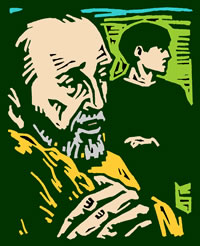
4th Sunday of Lent Year C
Traditionally, the liturgy of the fourth Sunday of Lent has sounded a joyous note – encouraging us as we reach the mid-point of our Lenten journey; inviting us to recognize the joy that will be ours of we are wholehearted in our turning to God. The joy to be found in our faith is a theme running through Luke’s gospel. In one passage, he puts together three parables of Jesus describing the joy of finding what was lost – the lost sheep, the lost coin, the son who was lost – as the response of Jesus to the criticism that he sat down with sinners. Though we have listened to it countless times, the story of the father whose loving reception of his wayward son gave him a new life moves us deeply every time we hear it. It is not surprising that it is chosen as today’s gospel reading.
This parable has different levels of meaning. Jesus made it clear that his first concern was to call old Israel to its true role in the generous designs of God (cf. Mt 10:6 etc). Against this background, the parable can be seen as referring to the whole drama of Old Testament history. The lost son stands for the covenanted people who have lost their way. The father in the story stands for the God of the covenant. The people’s failure to find new life - by entering into the divine love that inspired the covenant - has meant that their history has been filled with failure and frustration, even exile among foreigners. Not having learned the ways of God’s generous love, they are like mercenaries – like the prodigal, who thinks that he has lost his father’s love and can only hope to live with the household slaves; like the elder brother (standing for those who should have been guides for the people) who thinks he can earn the love of his father by ‘never disobeying his orders’. Like all genuine love, the love that inspires the God of the covenant is a mysterious gift; it can never be earned in the first place, and having been given will never be taken back: ‘You are with me always and all I have is yours’. As it concludes, the parable invites us to see the life of the wayward son as being changed for ever: as he comes, for the first time, to know the love that is in his father’s heart, and begins to share in all that that love inspires. At the personal level, the story told by Jesus invites us to take up our Lenten journey with renewed eagerness, reflecting that the selfless divine love that shapes God’s dealings with us is the ultimate mystery of our human existence: expressed already in the old covenant; shaping the whole story of creation; and finding its ultimate revelation in the Passover Mystery the Church is soon to celebrate.
One of the most memorable passages of Paul’s letters provides our second reading. The parable of Jesus called God’s people to be reconciled. Paul announces the final ‘reconciliation’ achieved by God in Christ. And he reminds us who have been united to God in Christ that we have a great responsibility towards our troubled world, to bring to it the Good News of this reconciliation: ‘We are ambassadors for Christ’, he tells us. Today’s first reading, continuing the story of Old Testament events, tells of the entry into the Promised Land: described as a new Passover – a reminder of the Pascal Mystery’s centrality to the whole story of the Scriptures.
John Thornhill sm

